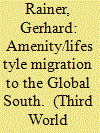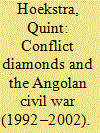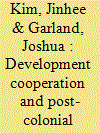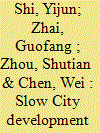|
|
|
Sort Order |
|
|
|
Items / Page
|
|
|
|
|
|
|
| Srl | Item |
| 1 |
ID:
167072


|
|
|
|
|
| Summary/Abstract |
While most research into amenity/lifestyle migration still focuses on rural places in the Global North, it has recently been acknowledged that international North–South migration is a growing phenomenon. Against the backdrop of strong media attention to Global North immigration, there is a need to focus more on the rapidly increasing – but much less visible – migration streams of lifestyle/amenity movers to the Global South, and particularly on their implications for local and global inequalities. This is what this paper proposes, and it pursues this goal by providing a comprehensive review of the growing interdisciplinary literature on amenity/lifestyle migration in Latin America. From a critical geographical perspective, it firstly discusses key political economic factors that drive the production of high-amenity places in Latin America. The focus will be on real estate business and land markets. Secondly, the article analyses the local to global socio-spatial consequences of international amenity/lifestyle migration. The paper argues that amenity/lifestyle migration to Latin America builds on, and deepens, historically inherited global and local inequalities, which in many areas – rural and, increasingly, also urban – manifest themselves through growing social-spatial exclusion and fragmentation.
|
|
|
|
|
|
|
|
|
|
|
|
|
|
|
|
| 2 |
ID:
167066


|
|
|
|
|
| Summary/Abstract |
In the early 1990s several rebel groups turned to natural resource extraction to pay for war. A key form of this is rebel diamond production, commonly referred to as conflict diamonds, which is widely perceived as being highly beneficial to insurgent organisations. Yet in the Angolan Civil War (1992–2002), the use of conflict diamonds by the National Union for the Total Independence of Angola (UNITA) resulted in a decisive insurgent defeat. How can this outcome be explained? Offering a nuanced understanding of how conflict diamonds affect civil war, this article shows that although diamonds generated considerable revenue for UNITA, they were not an effective method for them to take on the Angolan government. This was for two reasons: internally, the rebels greatly struggled to convert their diamond proceeds into sufficient goods and services; and externally, it left the group highly vulnerable to international countermeasures in the form of United Nations Security Council sanctions. Natural resource extraction may therefore not be as useful to rebel groups as is frequently believed.
|
|
|
|
|
|
|
|
|
|
|
|
|
|
|
|
| 3 |
ID:
167052


|
|
|
|
|
| Summary/Abstract |
With the rise of the South–South Development Cooperation (SSDC), the international development community has entered into a new paradigm of development cooperation. The Organisation for Economic Co-operation and Development – Development Assistance Committee (OECD-DAC) has had to consider what recently added members might have to offer, particularly South Korea given its dramatic transformation from official development assistance (ODA) recipient to donor. Post-colonial theory sees ODA as a system that reinforces the traditional hierarchy of North–South relations and reaffirms the hegemony of dominant countries; the SSDC has faced similar neo-colonial allegations. By employing post-colonial theory this paper investigates some neo-colonial criticisms of the ODA activities of major OECD-DAC and SSDC providers, before turning its focus on those of South Korea to determine whether it does indeed offer an alternative strategy to development. The African region was chosen as the focus in light of the increased amount of aid South Korea has allocated to the region. This paper concludes by offering a different role South Korea might play engaging within the OECD-DAC/SSDC context.
|
|
|
|
|
|
|
|
|
|
|
|
|
|
|
|
| 4 |
ID:
167048


|
|
|
|
|
| Summary/Abstract |
Increasing women’s representation in national legislatures has become a priority for international organisations and aid donors in recent decades. Existing studies emphasise structural barriers, whether economic, cultural or religious, that inhibit women’s participation in the public sphere. Little attention is paid to women who defy these barriers to win election in contexts that are hostile to their presence. This article addresses this gap. Using a Bourdieusian approach, it shows how three senior women leaders from the Pacific Islands translate symbolic capital into political capital. For donors and would-be reformers, the lesson is that institutional interventions must be implemented in ways which allow women’s symbolic capital to be deployed as political capital, or which enhance women’s control of various forms of capital. This message is particularly relevant for those interested in the capacity of quotas and other temporary measures to translate descriptive representation into substantive developmental gains.
|
|
|
|
|
|
|
|
|
|
|
|
|
|
|
|
| 5 |
ID:
167045


|
|
|
|
|
| Summary/Abstract |
Many government of developing countries show their commitment of reducing extreme poverty. A dominant thought considers that economic growth should be based on capital accumulation, productivity improvement, and access to international markets. This article tracts the system of assumptions that developing countries should meet to ensure that transfer models from developed countries could be efficient. We suggest a rebuilding of the transfer model by identifying some “structuring” conditions of developing countries, in particular by empowering universities to take a central role in the regional development process. From a poverty reduction perspective, the focus should be on the sustainability of local socio-technical systems, even if the options chosen are less efficient in the short term.
|
|
|
|
|
|
|
|
|
|
|
|
|
|
|
|
| 6 |
ID:
167058


|
|
|
|
|
| Summary/Abstract |
China’s aid is frequently portrayed as a challenger to established Overseas Development Assistance (ODA) norms, but it is unclear when the distinct ‘Chinese-model’ of aid emerged and how it has evolved over time. Using new historical data on Chinese aid in Africa and the case of Ethiopia, we have three main findings. First, China developed a distinct model of mixing ODA-like aid and commercial forms of economic engagement only after the mid-1990s, reflecting institutional reforms for allocating and managing foreign official finance. Second, social sectors have played a much greater role in China’s aid programme than is commonly perceived. Finally, Chinese aid to productive sectors has changed substantially whereas in social sectors it is relatively consistent.
|
|
|
|
|
|
|
|
|
|
|
|
|
|
|
|
| 7 |
ID:
167076


|
|
|
|
|
| Summary/Abstract |
This paper focuses on understanding the different evolutions of business’ associational paths in post-Import Substitution Industrialization (ISI) Chile and Uruguay, offering an explanation at the crossroads of the institutional change and international trade literatures. The argument is that the different forms in which ISI institutions were transformed during the liberalisation period facilitated a greater mobility of factors to different degrees, triggering divergent enduring associational strategies on the part of business. The proliferation of narrow-based special benefits during the ISI fuelled preferences for the formation of sector-based coalitions oriented towards rent-seeking activities. Nevertheless, while ISI regulations were displaced in Chile during the military period, Uruguay followed a gradual process of layering of new rules alongside old ones. These diverging strategies, having different effect on established inter-sectoral regulatory distortions, propitiated alternative associational paths of local business.
|
|
|
|
|
|
|
|
|
|
|
|
|
|
|
|
| 8 |
ID:
167061


|
|
|
|
|
| Summary/Abstract |
States in the same region are bound together by the ways in which the world imagines them as a collective. One distinguishing feature of post-Cold War regionalism is its outward orientation – the importance of the external dimension of regional cooperation. By and large, though, existing analysis of regional institutional development in the Global South does not explicitly conceptualise and theorise collective image consciousness and management. This paper works to address this conceptual gap. Making use of two cases of regional image crisis – post-1980s Africa and post-1997 Southeast Asia – it draws out two primary logics of regional image consciousness: the logic of influence and the logic of resources. A region’s ‘brand’ with respect to (dys)function and international norm (non-)compliance matters to regional actors because it affects the region’s political influence in international arenas and the region’s ability to attract resources from donors and investors.
|
|
|
|
|
|
|
|
|
|
|
|
|
|
|
|
| 9 |
ID:
167054


|
|
|
|
|
| Summary/Abstract |
The Slow City concept advocates the development of cities by combining modern technologies and traditional lifestyles to provide efficient transportation and communication and high quality of life for the residents. This study investigates the present situation, development approach and public acceptability of the Slow City concept in China. Based on the theory and the practical application of the Slow City concept in major member countries, the development process of Slow City can be divided into three stages: the origin stage, the development stage and the promotion stage. This study shows that the Slow City development in China is at the third stage. Due to diverse economic foundations, cultural traditions and the sociopolitical environment, the Slow City in China represents different features compared to the Slow City in Europe. A systematic analysis provides a better understanding of the situation of the Chinese Slow City. Then, the authors evaluate the degree of acceptability of the Slow City concept in China based on three aspects: the understanding, the awareness, and the popularity of the Slow City. Based on the results, this paper suggests optimistic growth opportunities for the Slow City in China and provides several strategies with regard to diverse perspectives.
|
|
|
|
|
|
|
|
|
|
|
|
|
|
|
|
| 10 |
ID:
167068


|
|
|
|
|
| Summary/Abstract |
The acknowledgement of politics and institutions in developing countries is well in line with debates not only in the area of development effectiveness but also regarding new public management. Results-Based Approaches (RBApps), conceptually framed within these two debates, are designed to support outcome- and impact-oriented development goals. They link the achievement of results to monetary and/or non-monetary reward mechanisms. However, so far, development cooperation partners have mainly applied RBApps in the form of Results-Based Finance and Results-Based Aid. Through the provision of a conceptual framework, this paper embeds RBApps between different tiers of government within the discussion and applies Rwanda as a case study to it. Along the lines of Rwanda’s Domestic Performance Approach Imihigo, the article argues that development co-operation should be more proactive in considering these approaches, as they might be crucial in terms of sustainability and serve as a promising entry point for programmes supported by development partners.
|
|
|
|
|
|
|
|
|
|
|
|
|
|
|
|
|
|
|
|
|